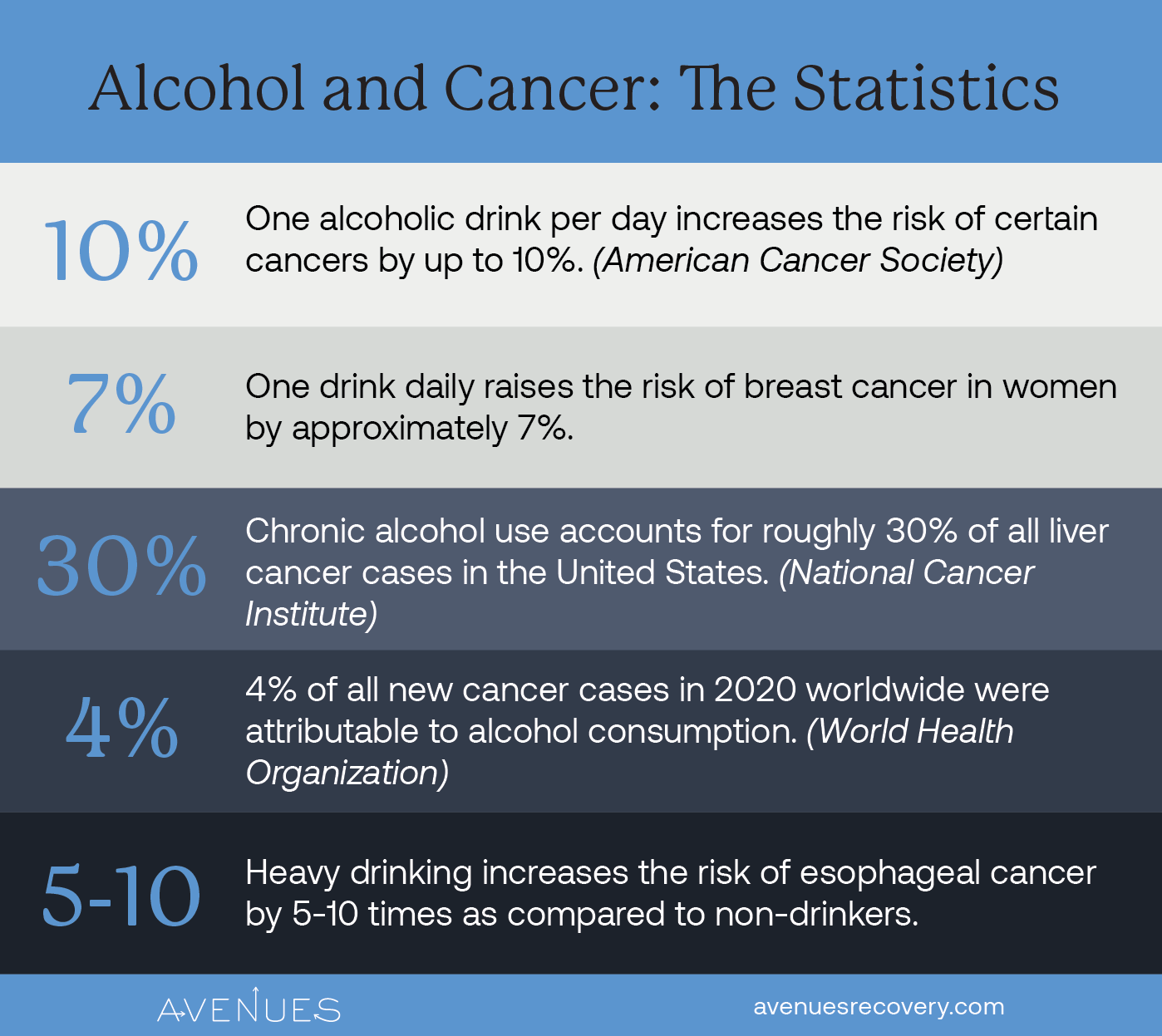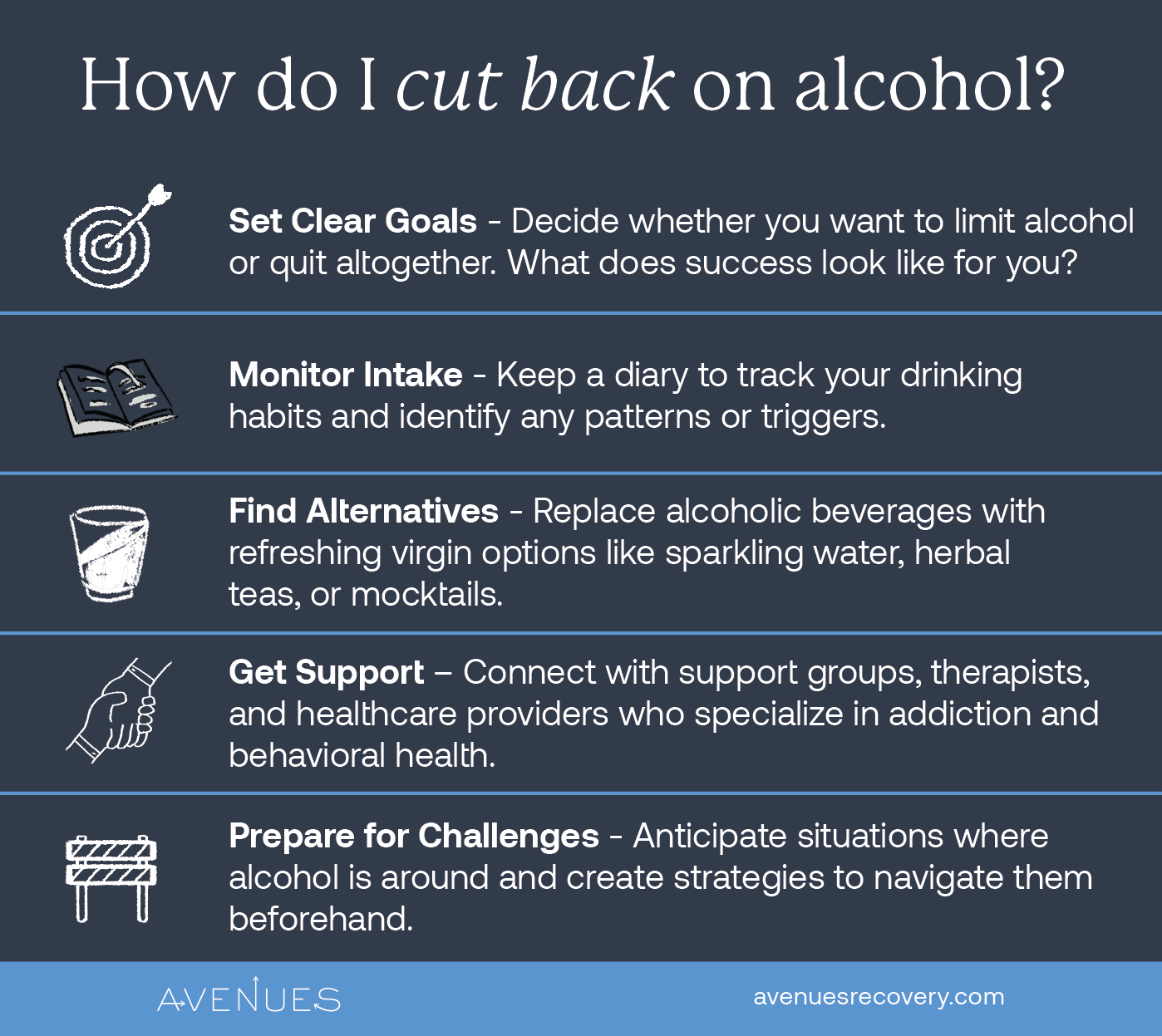Drinking alcohol increases the risk of cancer. The more a person drinks, the higher the risk.
Key Takeaways:
- Drinking alcohol increases the risk of cancer, and the more a person drinks, the higher the risk.
- Alcohol is strongly linked to seven cancers: breast, liver, colorectal, mouth, throat, esophageal, and laryngeal (voice box).
- Even small amounts of alcohol can raise cancer risk, meaning there is no safe level of drinking.
- Cutting back or quitting alcohol lowers cancer risk over time and allows the body to begin repairing itself.
- Public health experts, including the U.S. Surgeon General, warn that greater awareness and action are needed to address alcohol’s role in cancer.
Does Alcohol Cause Cancer?
Yes, alcohol causes 7 types of cancer by increasing the risk, even when consumed in small amounts.
It’s not always easy to stay on top of every health concern, and many people find this information surprising. The important thing to know is that drinking less can meaningfully lower your cancer risk and protect your health.
Alcohol consumption has long been a topic of debate in public health, with its serious health risks often overlooked by social acceptance. However, growing evidence highlights the serious and sometimes fatal consequences of alcohol use - particularly its link to various types of cancer.
This article delves into the science behind alcohol’s role in cancer development, discusses the recent warning issued by the U.S. Surgeon General, and offers steps for reducing alcohol-related risks. At Avenues Recovery, we see firsthand how misusing alcohol impacts our health, and our programs provide medical detox, counseling, and long-term recovery support for those looking to stop drinking.

The Link Between Alcohol and Cancer
Alcohol consumption is now known to be a well-established risk factor for multiple forms of cancer. Alcohol is classified as a Group 1 carcinogen by the International Agency for Research on Cancer (IARC), which means that there is sufficient evidence to conclude that it causes cancer in humans.
What Is the Most Common Cancer Caused by Alcohol?
The most common alcohol-related cancer is breast cancer. Studies show that even low to moderate drinking increases the risk, and the risk rises with higher levels of alcohol consumption.
What Other Cancers Are Caused by Alcohol?
Alcohol is a known risk factor for at least seven types of cancer. Some cancers have a strong and well-documented connection to alcohol use, while others show only a possible link, and a few have little to no clear evidence.
|
Cancer Type |
Evidence Strength |
Details |
|
Breast cancer |
Strong |
Even small amounts of alcohol increase risk. |
|
Throat cancer |
Strong |
Risk is especially high when combined with tobacco use. |
|
Colorectal cancer (colon and rectum) |
Strong |
Risk rises with amount consumed. |
|
Liver cancer |
Strong |
Alcohol-related cirrhosis is a major cause. |
|
Esophageal cancer |
Strong |
Particularly squamous cell carcinoma. |
|
Mouth cancer (including tongue) |
Strong |
Strong link, especially with smoking. |
|
Pancreatic cancer |
Modest |
Growing evidence that heavy use may raise the risk, often through chronic pancreatitis. |
|
Bladder cancer |
Limited |
Evidence is limited and inconsistent. |
|
Stomach cancer |
Limited |
Some studies suggest a link but not definitive. |
|
Skin cancer |
Limited |
Weak evidence of alcohol raising melanoma risk. |
|
Prostate cancer |
Unclear |
Research is mixed, no strong conclusion. |
|
Lung cancer |
Unclear |
Risk largely tied to smoking, not alcohol. |
|
Kidney cancer |
Unclear |
No strong evidence; some studies suggest no risk or slight reduction. |
|
Brain cancer |
No clear link |
No consistent evidence connecting alcohol. |
|
Ovarian cancer |
Unclear |
Studies show mixed or inconclusive results. |
How Does Alcohol Cause Cancer?
Alcohol can increase cancer risk by damaging DNA and affecting the body’s natural defenses. This happens in four ways, including:
- DNA damage from acetaldehyde: Ethanol, the active ingredient in alcoholic beverages, is metabolized by the body into acetaldehyde, a toxic and carcinogenic (cancer-causing) compound. Acetaldehyde can damage DNA and interfere with the body’s ability to repair damaged cells. This process creates a fertile ground for the development of cancerous cells.
- Nutrient Deficiency: Alcohol also hinders the body’s ability to absorb essential nutrients such as folate and vitamins A, C, D, and E, which are crucial for DNA repair and cellular health.
- Hormone Changes: Alcohol consumption can elevate estrogen and testosterone levels, increasing the risk of hormone-related cancers such as breast and prostate cancer.
- Oxidative Stress: Alcohol metabolism produces reactive oxygen species that can damage cells and DNA, promoting cancer development.
Statistics on Alcohol Consumption and Cancer Risks

These numbers all highlight the urgent need for increased public awareness about alcohol’s risks, and real preventive measures to address alcohol’s role in cancer development.
Is Drinking in Moderation Harmful?
Yes, even moderate drinking can increase the risk of certain cancers. That doesn’t mean you must quit entirely, but it does mean cutting back, even by a little, can lower your risk.
One of the most hot-button topics in regard to drinking is whether or not moderate alcohol consumption is safe. Moderate drinking is usually defined as up to one drink per day for women, and two drinks per day for men. However, emerging research has challenged the old notion that moderate alcohol use is harmless.
No Safe Level: A groundbreaking 2023 meta-analysis concluded that there is no safe level of alcohol consumption, as even low levels can contribute to cancer risk.
Breast Cancer Risk: For women, even light drinking has been shown to elevate breast cancer risk, particularly for those with additional risk factors such as obesity or genetic history of breast cancer.
Cumulative Impact: Interestingly, the risks associated with alcohol are cumulative, meaning that even moderate drinking over a long period can lead to significant health consequences.
While some studies suggest that moderate drinking may have cardiovascular benefits, these findings are increasingly being called into question. Public health experts emphasize that the very real potential risks, particularly regarding cancer, far outweigh any possible benefits.
Surgeon General’s Warning of New Findings on Alcohol and Cancer Risk
In early January of 2025, U.S. Surgeon General Dr. Vivek Murthy issued a historic advisory on the causal relationship between alcohol consumption and increased cancer risk. His advisory aimed to address a critical lack of public awareness, emphasizing that all types of alcohol - beer, wine, and liquor - pose similar cancer risks. Dr. Murthy also urged for enhanced public health measures, including the implementation of clear cancer warning labels on alcoholic beverages.
“The evidence is clear: alcohol consumption, even at moderate levels, significantly increases the risk of developing cancer,” said Dr. Murthy. “We must prioritize public education and empower individuals to make informed choices about their health.”
The recent advisory cited some rather alarming statistics, including:
- Breast Cancer: Alcohol is responsible for approximately 15% of cases globally.
- Oral and Throat Cancers: Alcohol consumption accounts for nearly 20% of cases.
- Colorectal Cancer: Regular alcohol use increases the risk by about 15%.
This warning is an important reminder of the need to re-evaluate the way we view alcohol, and it encourages us to make an effort to reduce its health impacts and create a healthier environment for all.
Does Alcohol Increase Cancer Risk in Women?
Yes, research shows that alcohol and cancer risk in women are closely connected. If you’re someone who enjoys a glass of wine or a cocktail now and then, it can feel unsettling to learn that even moderate drinking is linked to higher cancer risk, especially breast cancer.

It’s important to know the risks, so you can be informed when making health choices. Alcohol can raise estrogen levels, damage DNA, and make it easier for cancer cells to grow. The more alcohol consumed, the higher the cancer risk in women. But every choice matters: even cutting back a little can lower your risk and give you more control over your long-term health.
Is Alcohol The Leading Cause of Cancer?
No, alcohol is not the leading cause of cancer, but it is a major preventable risk factor. The main causes of cancer include:
- Tobacco use – the single biggest cause of cancer worldwide.
- Unhealthy diet and obesity
- Infections
- Physical inactivity
- Alcohol consumption – responsible for about 4–5% of all cancers globally, strongly linked to breast, liver, colorectal, mouth, throat, and esophageal cancers.
Why is Alcohol’s Cancer Risk Often Overlooked?
Despite the serious risks mentioned above, the connection between alcohol and cancer remains mostly overlooked. One reason is the widespread normalization (and even glorification) of alcohol in social settings and media.
Even healthcare narratives sometimes highlight the supposed “benefits” of moderate drinking. Yet another factor is the alcohol industry’s wide influence on public perception, through marketing campaigns that downplay risks and emphasize the enjoyment and relaxation that alcohol offers.

How to Reduce the Risk of Cancer by Cutting Back on Alcohol
Reducing or eliminating alcohol consumption altogether is one of the most effective ways to lower your cancer risk. Below are some strategies to help you cut back on alcohol or quit safely:

What Is the Sober Curious Movement?
The sober curious movement has gained definite traction in recent years, promoting alcohol-free living as a path to improved health, clarity, and well-being. Initiatives like Dry January, as well as sober social events, provide individuals with opportunities to explore life without alcohol in supportive environments. These movements not only help reduce individual risk but also contribute to shifting societal norms around drinking.
Alcohol Addiction Treatment at Avenues Recovery
For many people, alcohol begins as a way to cope, but over time it can cause more harm than healing. If it is affecting your health, relationships, or peace of mind, you may have an alcohol addiction. However, you don’t have to face those struggles on your own. Avenues Recovery Center offers supervised medical detox and quality inpatient treatment in a clean, modern, homelike setting, and accepts Medicaid as well as commercial insurance.
Reach out to Avenues Recovery 24/7 to speak with one of our skilled, compassionate admissions representatives to hear about our program options and discover what may be right for you.
Hope and healing are always possible; you can begin your journey home today!
FAQs About Alcohol and Cancer Risk
-
Does alcohol make cancer spread faster?
Alcohol does not directly make cancer spread faster, but it can weaken the body’s defenses and create conditions that make cancers harder to control.
-
How much does alcohol increase cancer risk?
Alcohol increases cancer risk in a dose-dependent way - the more you drink, the higher the risk, even at low to moderate levels.
-
Does cancer risk decrease after quitting alcohol?
Yes, cancer risk decreases after quitting alcohol. The body begins repairing itself over time, and the longer you stay alcohol-free, the more your risk drops - especially for cancers of the mouth, throat, liver, and colon. While past drinking still matters, quitting can make a meaningful difference to long-term health.
-
Does alcohol in mouthwash cause cancer?
Alcohol in mouthwash has been linked to a possible increase in oral cancer risk, but research results are not conclusive. Occasional use is unlikely to be harmful, but frequent, long-term use of high-alcohol mouthwashes may carry some added risk.
-
Does rubbing alcohol cause cancer?
No, rubbing alcohol does not cause cancer when used on the skin as intended, though it can be harmful if ingested or inhaled in large amounts.



